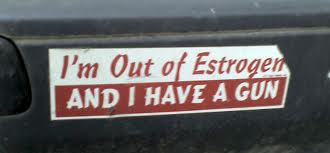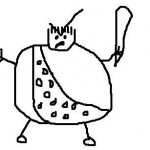“You’ll save him. You always do,” says Amelia Pond to the Doctor.
“Not always,” he replied, barely able to look at her as she hovers over the pile of ash that used to be her husband.
“Then what,” she responds icily, “is the point of you?”

It’s one of the most painful lines in the latest incarnation (since 2005) of Doctor Who. It’s the first unavoidable sign that there’s something amiss in Amy’s relationship with the Doctor, the first sign she sees him as something other than an equal. It shows that she has a childish perception of him: he’s there to fix things for her. That’s the point of his existence. If he doesn’t do that, he’s worthless to her.
This is totally dehumanizing and selfish on her part, right? The Doctor is a person, after all. He has desires and needs and purposes of his own; he doesn’t live to fulfill her hopes.
So why do we tolerate that kind of language about half the human population?
(Click the end of each quote for source.)
For the typical woman, I’m sorry to say nature is not in your favor. You are meant to have fat, and your biology will make sure you do. This is primarily due to the fact that your body was made to bear children.
We must stop chasing the impossible – this “thin ideal.” Because most fashion models are thinner than 98% of most American women. Because if mannequins were women, they would be too thin to bear children. It’s time to focus on the “healthy ideal,” which looks different for every woman, and focuses on health, not weight or size.
It is natural for women to be able to bear children, and if the “ideal” means that you would not actually be able to do something that is natural for your body, then obviously it’s not really that healthy.
And even if women bear themselves weary or they bear themselves out that does not hurt. Let them bear themselves out. This is the purpose for which they exist.
(Attributed to Martin Luther. My searching has turned up dubious results on the authenticity of this quotation. Can anybody with facts help me out here? Everything I’ve read on the quote is polemical, saying (a) Luther never said it, or (b) yes, he totally did, or (c) Luther said it but was grossly misunderstood. Doing a proper study of the quote would take more time than I have to allocate!)
And, last but not least, the actual statement made to my anorexic teenage self by a member of my old church:
But women without fat on their hips can’t bear children!
Nice to know you care, lady.
You’ve probably noticed that the above quotations aren’t just from religious people. This is pop culture as much as it is Christian culture. A related phenomenon is the reduction of all observed biological differences to testosterone-estrogen levels:
Why women respond differently seems obvious. Women are, after all, awash in the hormone estrogen, which, some new science suggests, has greater effects on metabolism and muscle health than was once imagined.
The limitations of such generalizations came into a stark light a few years ago when South African athlete Caster Semenya was subjected to “gender testing” and forced to withdraw from competition due to intersexed characteristics that caused her to drastically outperform her fellow female competitors. So convenient have testosterone and estrogen been for explaining the differences between men and women that medical and athletic publications often have to remind readers that women have any testosterone at all.

Without getting lost in the medical details, I want to talk about the “what for” part of biology – the part that ceases to be biology and becomes culture.
When I was a little girl, every “why” I asked about my body was catapulted back to childbearing:
Why do I have a period? Because your body is getting ready to get pregnant.
Why am I gaining weight? Because estrogen makes you store fat. Why? Because your body needs fat to insulate the baby when you’re pregnant.
Why do I have breasts? For feeding your babies. Why do they stick out? To attract men so they’ll want to have babies with you.
Why are boys stronger than me? Because your body was meant to have babies, not build muscle.
Why shouldn’t I be skinny? Because you won’t be able to have babies!
“But,” you might say, “some of those questions were about reproduction! Of course menstruation is linked to childbearing – it’s your uterus, after all!” Yeah. Sure. Them’s the facts. The problem is, nobody ever explained to me that menstruation is an indicator of health for women – they just jumped straight to childbearing as the reason I shouldn’t starve myself. Nobody bothered to talk to me about vitamins, minerals and the risk of osteoporosis. It was just about the babies.
Nobody bothered to tell me that women can get strong, either. Nobody told me that plenty of women are physically bigger and stronger than a great many men. Nobody mentioned that, in a culture where strength is seen as masculine and men are expected to do heavy work for women, women have fewer opportunities to develop their strength. Nobody acknowledged that women are actively discouraged from putting on muscle because “bulky” isn’t “sexy”. Nobody handed me a barbell and said, “Well, why don’t we see what you can do with this?”
The problem isn’t that references to childbearing are factually wrong, it’s that they’re far too often the only answer girls get. Girls! Your lives aren’t defined by the possibility of pregnancy, even if you do bleed once a month. Estrogen isn’t just some annoying substance that makes you cramp up and gain weight so you can have babies – it helps you by strengthening your bones. Your period may factually be about your uterine lining and fertility, but that’s not the whole story, either. Your period can help tell you whether or not there’s anything wrong in your body, like a nutrition deficiency. What your period is might be a matter of science, but what it’s for is what our culture makes of it.
Your body may have the capacity to bear children, but that’s not what it’s for. It’s for keeping you alive.
The point of your body is you.
Although I couldn’t articulate it at the time, I definitely noticed as a girl how nothing about young men’s health was explained in terms of their potential for fatherhood.
Why is my voice changing? Testosterone. You’re becoming a man.
Why am I sprouting all this hair? Testosterone. You’re becoming a man.
Why am I getting so tall so fast? Testosterone. You’re becoming a man.
Why do I wake up in the morning with an erection? Testosterone. You’re becoming a man.
Well, that was easy. If we explained things to boys the way we do to girls, the answers would look more like this:
Why is my voice changing? It’s a sign that you’re getting ready to be a father.
Why am I sprouting all this hair? To keep you warm since you don’t have enough estrogen to store more fat.
Why am I getting so tall so fast? So you can compete with other men and have more children.
Why do I wake up in the morning with an erection? Your hormones are telling you to go out and reproduce.
Fertility is just not center stage when we talk to boys, even about puberty. When we talk to kids of all sexes, we provide two answers: the biological cause (testosterone or estrogen) and the social meaning (you’re becoming an adult), but only one sex gets the extra level of what for. What if the what for wasn’t always about pregnancy? What if boys were given a what for that involved their potential to father children?
Finally, I don’t want to end this post without acknowledging that the questions kids ask about puberty are usually much more complex and infused with anxieties about what kind of adults they want to be. If you’re a cis male and worried about your body hair, it might well be because you don’t want to have it or you’re worried you don’t have enough. If you’re a transgendered kid of either sex, you might be negotiating the problem of your body taking a wrong turn towards a kind of adulthood you don’t want – or you might be frustrated that society is interpreting your body’s changes as a sign that your personality is changing, too. If you’re a cis female, you might resent getting your breasts or period early or be worried that you haven’t got them yet, or that there’s something “wrong” with the way they’re presenting. In real life, the what for can be damaging on all kinds of levels. Who we want to become seldom looks anything like the Ken-and-Barbie prognostications we get from our parents and teachers. In my own case, the explanation I got was exactly who I was most afraid of becoming.
What will I do about it? I don’t know for sure. But if I ever have a little girl, I have some ideas to start with. I’ll make sure to tell her, whenever pregnancy comes up, that it’s a matter of “if you want to,” not “when you do.” I’ll tell her that her period has meanings other than “hey, you’re ovulating!” – even if the only other reason I can come up with is “hey, you’re not malnourished!” (yay, right?!). And I’ll tell her that whatever her body does is normal for her – whether that means she hits puberty “early,” “late,” or never.
Oh, and most importantly: The point of you is you.
















